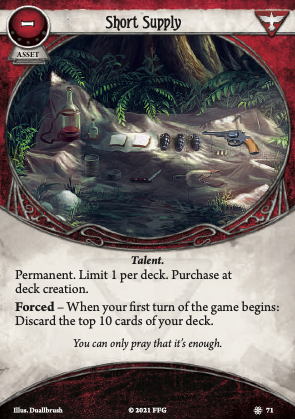To round out the cycle of 'mash a calculator a bunch to help you make decisions with cards' reviews, here is a mathematical analysis of the odds of this card single handedly bricking your deck by removing all copies of a critical card.
TL;DR: They are very low unless you are being a dummy about it. Very good in decks that already have recursion.
Your odds of failing to find a copy of a two of card in your deck if you ‘hard mulligan’ for them (That is, discard any card that is not a copy of said card) are 45%. If you fail to find that pair, the odds that short supply will hit both copies in the initial 10 discards are 18%. Y This means your odds of bricking a scavenging deck with this are about 5%, meaning it should happen about 1 in 20 games. Unlikely but still possible, and if your muligain policy isn’t that biased towards your copy of scavenging or whatever, it gets worse.
Once you add in one secondary way to recur the card you want (maybe you are already running resourceful+true survivor, or maybe you splash resourceful in with scavenger), your odds of failing to find either on your initial mulligan are 19%, and after that the odds both the primary tool you want and the way you recur it are only 1%. That means you being without any way to get your scavenging back should only happen about 1 in 150 games.
After that, the odds of things blowing up in your face become infinitesimally small (your odds of nuking all copies of something you have 5 redundant copies of is less than 1 in 1000, for example, you won’t be playing with short supply decks enough times in your arkham horror career to EVER see it).
Which is kinda funny, because it makes this probably the most stable and generally useful ‘mucking with your deck’s probability’ cards of the EOTE cards, as long as your deck values discard recursion. Not every survivor is going to run it, but it is far more broadly useful than Forced Learning and doesn’t attempt to create an entirely new archetype like Underworld Support or Gear Up. It is just… really REALLY good in any deck that runs multiple recursion tools already.
So just slap scavenging, resourceful, and scrounge for supplies to do your deck, like you wanted to do anyway because they are just good survivor cards, and your set, easy peasy, short supply is a mindless auto-include if you run any level of recursion because it basically gives you a second hand, right?
Well, obviously this math becomes much more brutal if you have tools you CAN’T recur. Suddenly any tool you can’t hard mulligan for is going to have both of its copies in the bin 20% of the time. It becomes impossible to have redundancy for some things: Items and skills are easy, but allies, events, and other intangible assets are much harder, and so for every duo you slot into your deck, you are rolling 20% odds of just not seeing them again. This means once a campaign you may just not have a card key to your deck. This means while this card set is very good you should ideally already be planning to recur things a little bit, and be very aware of what you can and can’t recur in your deck. Pete Sylvester is still totally fine if you already run a recursion package because you can scoop him back up with resourceful, but you have no tools to get back say… your Beat Cop (2) if you are playing Tommy. So maybe don’t play this if you use a ton of non-survivor non-item cards of a level higher than one: it isn't gunna be ideal for event based Preston or ally based Tommy, Agnes almost certainly doesn't want this, ect. Even if you already are running recursion tech, this will do damage to your deck a significant enough time to not be worth it for those characters. You are looking at primary red+Minh and Bob as candidates for this to toss into a scavenging deck.
Also, this is really not a great way of avoiding your bad signature weakness. In 1/3rd of scenarios you play, this will nuke it, but in the other 2/3rds you will see it faster. So maybe don’t play it in say… Wendy where all this does is cause you to lose control of what cards you are exposing to the risk of getting nuked. It may also be a bit spooky if your weakness is one you might struggle with if you draw it early, and it can exacerbate basic weaknesses that can shuffle into your deck as well.
